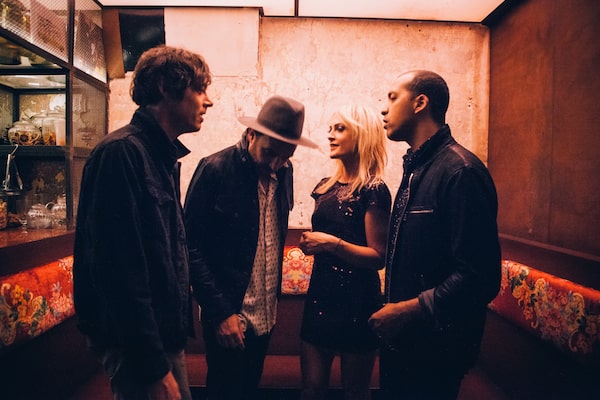
Metric's seventh record, The Art of Doubt, arrives Sept. 21 via MMI/Crystal Math Music.Justin Broadbent
What you should never, ever do is call a song “content.”
On a truly miserable, rainy Monday, I am sitting across from Metric’s Emily Haines and Jimmy Shaw (and Haines’s toy poodle, Romeo) in their downtown Toronto studio. I ask what it’s like in the digital era for a band – especially one with an almost 20-year career – to make content that is so readily available for consumption on people’s phones.
“First of all, we don’t call it ‘content,’” Haines says.
It isn’t a prickly answer but a necessary correction. The way music, or any art, is marketed in today’s landscape, as “content," puts the emphasis on what is being sold, rather than the value of the art itself. Audiences, and artists, are stuck somewhere in this infinity loop. Yet, Metric still lives and aches to make art – hoping we hear it authentically, and not just as content.
Their seventh record, Art of Doubt, arrives Sept. 21 via MMI/Crystal Math Music. Starting with its lead single, Dark Saturday, the album is classic Metric: blistering, danceable, but tender and contemplative, too. It may evoke the sound of their early releases, Old World Underground, Where Are You Now? or perhaps Live It Out. But those are easy and lazy comparisons. They aren’t that band from the early 2000s, and they aren’t giving us nostalgia.
For this album, Metric focused on the principle of creating music as a unit, remembering their roots as a collective entity and not separate individuals. This led to a bare-bones, less concept-heavy approach.
Two things allowed them to do this. First, Haines credits a career built on constantly pushing forward to find new creative direction. The second: They made this album directly after Haines’s second solo effort, Choir of the Mind, in 2017. The band works constantly, Haines emphasizes, but the material for Art of Doubt, and Haines’s experience on Choir, gave them a different energy altogether.
The process of working on her own album helped Haines approach Art of Doubt with a renewed outlook. "It was a natural refresh in the work. When it came to doing Metric, I was like a newborn babe.”
Shaw returned to guitars rather than helming production, as he has done on several previous albums. Producer Justin Meldal-Johnsen, who has collaborated with Beck and Nine Inch Nails, among dozens more, stepped in. “We never really had anybody come over the talkback mic and tell the entire band that they were just killing it right now," Shaw says of Meldal-Johnsen’s contribution.
When I ask what they’re trying to tell listeners with this record, they are hesitant. Art of Doubt is no manifesto on the state of the world. That’s not Metric’s style. “I don’t feel capable of definitive statements, my sound bite ability, in 2018,” Haines says. “I am here in favour of nuance. I don’t know that there are big, overarching statements [on the record] that can contain the reality, the complexity, of the time we are living in, you know?”
Instead, Shaw says, it’s a collection of feelings about "what it’s like to be alive right now. It’s a super dynamic, exciting, confusing time.”
The album may not be a direct reaction to today’s world, but it was influenced by one particular moment. Three years ago, when Metric released Pagans in Vegas, Apple Music had recently launched, changing the entire landscape of the music world. During the three-month trial period of the service, Apple wasn’t paying royalties to artists. But, thanks to – Shaw says – Taylor Swift’s influential letter against the decision, it was quickly reverted.
The experience had a profound impact on the band, emphasizing how technology has changed the entirety of their business, beyond just the way people buy music.
“There is a spirit on [Art of Doubt] like, ‘Wow, we made it out alive!’” she says. “The fact that we have been able to embrace still making records when there’s no record store… you gotta be adaptable!”
Haines admits to navigating the murky waters of the digital era with trepidation. You can hear this on the track Die Happy, where she sings about how the world has become dystopic to some, about how some of us are drunk on today’s Kool-Aid, which consists of a brew of always-on technology and endless digital sharing, and about how all this leads to a lack of true presence in our lives.
What was meant to be brief conversation – their last interview of the day – ends up being a 45-minute summit on the existential experience of being a human in 2018. An article can’t fully grasp the nuance of the conversation, and neither can 12 songs on a record. As our chat comes to a close, we are back at the beginning, talking about what artists make, what they sell and what they hope to gain today.
“I hope this record makes people feel a bit more engaged and in the urgency of things but not from a place of fear,” Haines says, “but from [the perspective of], you’re alive, what are you going to do about it?”